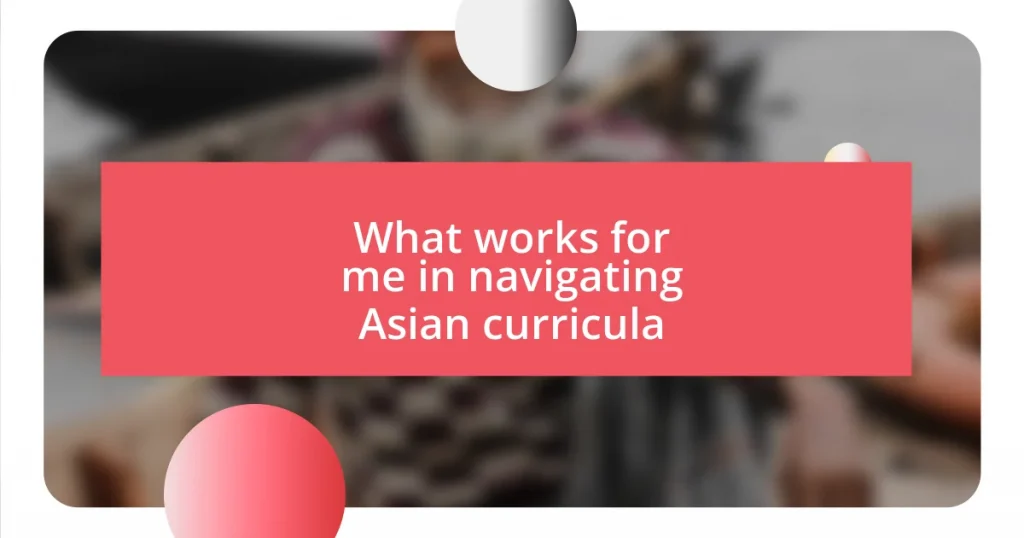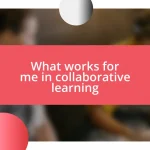Key takeaways:
- Challenges in Asian curricula include rote memorization, pressure to excel, and language barriers, necessitating adaptability in learning styles.
- Effective study techniques such as active recall, spaced repetition, and collaboration in study groups enhance retention and foster enjoyable learning experiences.
- Cultural dynamics and local resources play a critical role in collaborative learning and personal growth, highlighting the importance of mentorship and community engagement.
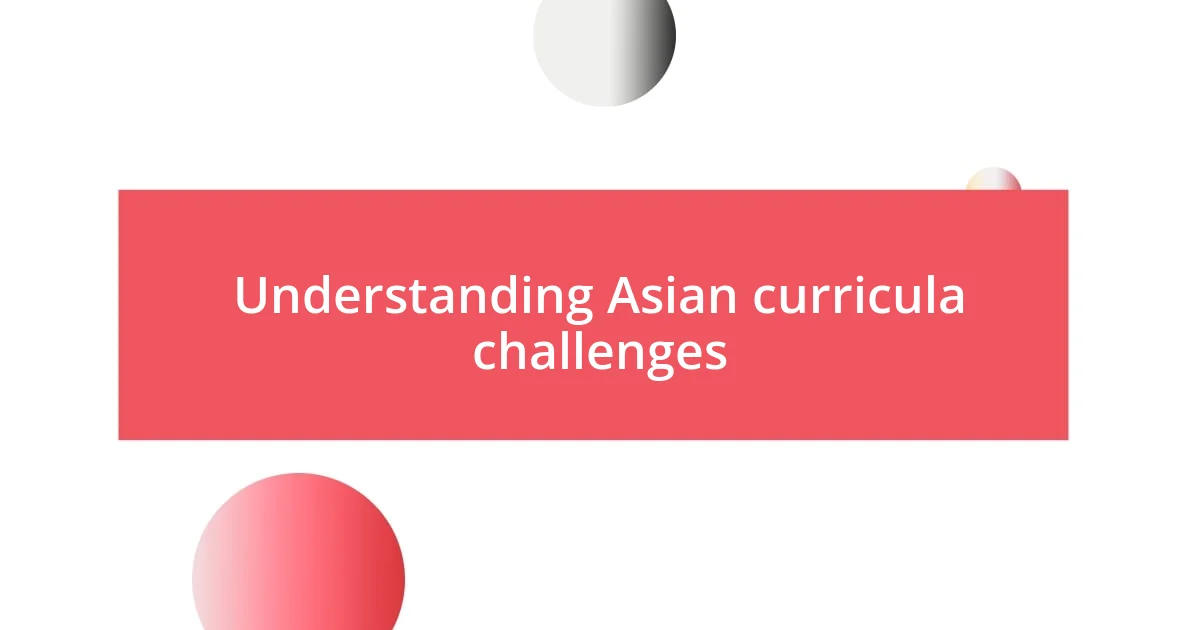
Understanding Asian curricula challenges
Navigating Asian curricula presents a variety of challenges that often stem from cultural nuances in education. For instance, I once struggled with the rigorous insistence on rote memorization in my studies. It was a stark contrast to the critical thinking approach I was accustomed to, leading me to ask myself: How can I adapt my learning style to thrive in this environment?
Aside from memorization, the pressure to excel creates an intense atmosphere. I recall the countless hours spent preparing for exams, feeling that my worth hinged on perfect scores. It made me wonder, does this relentless focus on grades overshadow the joy of learning? I believe many students experience this conflict, recognizing the value of education but feeling trapped by expectations.
Additionally, language barriers can complicate the learning experience. In my own journey, I encountered challenges in understanding complex concepts expressed in my second language. It often left me grappling with frustration and self-doubt. How many of us have faced similar hurdles, questioning our competence? I found that seeking support from peers and teachers made a huge difference in overcoming these obstacles, bridging the gap between confusion and clarity.
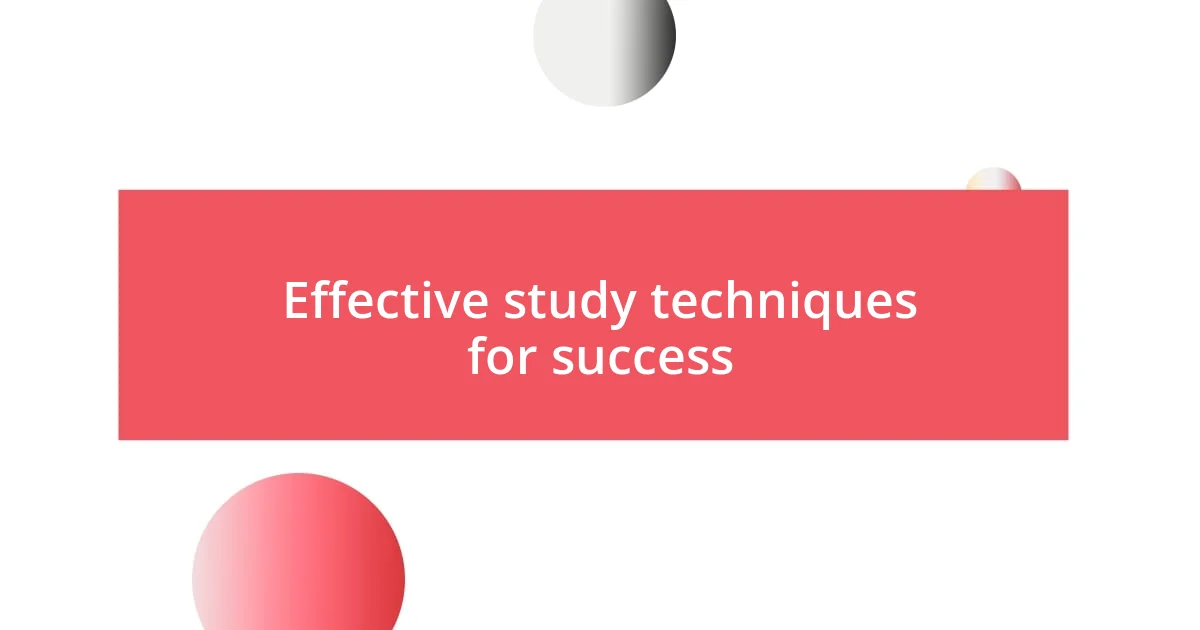
Effective study techniques for success
Effective study techniques vary widely, but a few methods have stood out to me through my experiences. For instance, incorporating active recall has dramatically improved my retention of complex material. When I regularly quiz myself on key concepts after studying, I find that they stick better in my mind. Have you ever noticed how discussing a topic out loud can solidify your understanding? I certainly have.
Another technique that made a significant difference for me was the use of spaced repetition. Early in my journey, I crammed before exams, which left me feeling overwhelmed and underprepared. However, by breaking my study sessions into smaller, manageable chunks and revisiting the material over time, I felt much more at ease and confident. I remember passing a particularly challenging subject by employing this technique, which not only helped me master the content but also reduced my anxiety.
Lastly, forming study groups has been incredibly beneficial. In my own experience, working with classmates allows for diverse perspectives and insights. I vividly recall how a late-night group study session transformed a daunting syllabus into a collaborative exploration of ideas. The laughter and shared moments turned learning into a joy rather than a chore. Have you ever tried studying in a group? The camaraderie can truly make the process more enjoyable.
| Technique | Description |
|---|---|
| Active Recall | Testing yourself on the material to enhance retention and understanding. |
| Spaced Repetition | Revisiting material over time to reinforce memory and reduce anxiety. |
| Study Groups | Collaborating with peers to gain diverse insights and make learning enjoyable. |
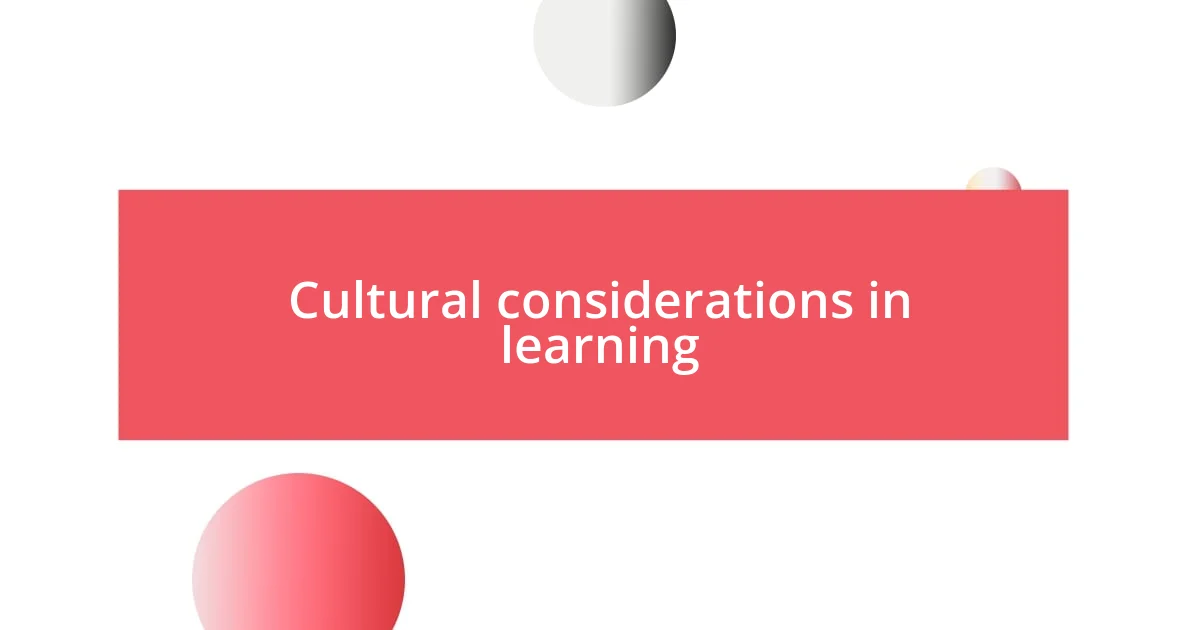
Cultural considerations in learning
Cultural considerations in learning are essential for understanding how different backgrounds can influence educational experiences. For me, navigating class dynamics often felt like walking a tightrope. In many Asian learning environments, respecting authority and group harmony takes precedence, which can create anxiety when trying to voice my opinions. I remember feeling a wave of relief during a group project when I saw my peers openly share ideas, yet I grappled with whether my contributions would be welcomed or dismissed. This balancing act between respecting tradition and asserting individuality is something I continue to manage in my learning journey.
- The emphasis on collectivism often shapes classroom interactions.
- Trying to find a voice in discussions can be challenging, especially when culture prioritizes hierarchy.
- Anonymity in assessments can foster openness, making it easier to express thoughts without fear of repercussions.
- Celebrating academic achievements in a communal way can build confidence and strengthen relationships among peers.
Understanding these cultural nuances can truly impact how one navigates their studies and relationships with classmates and educators. Just reflecting on these experiences has illuminated the paths I can take to foster a richer learning environment for myself and others.
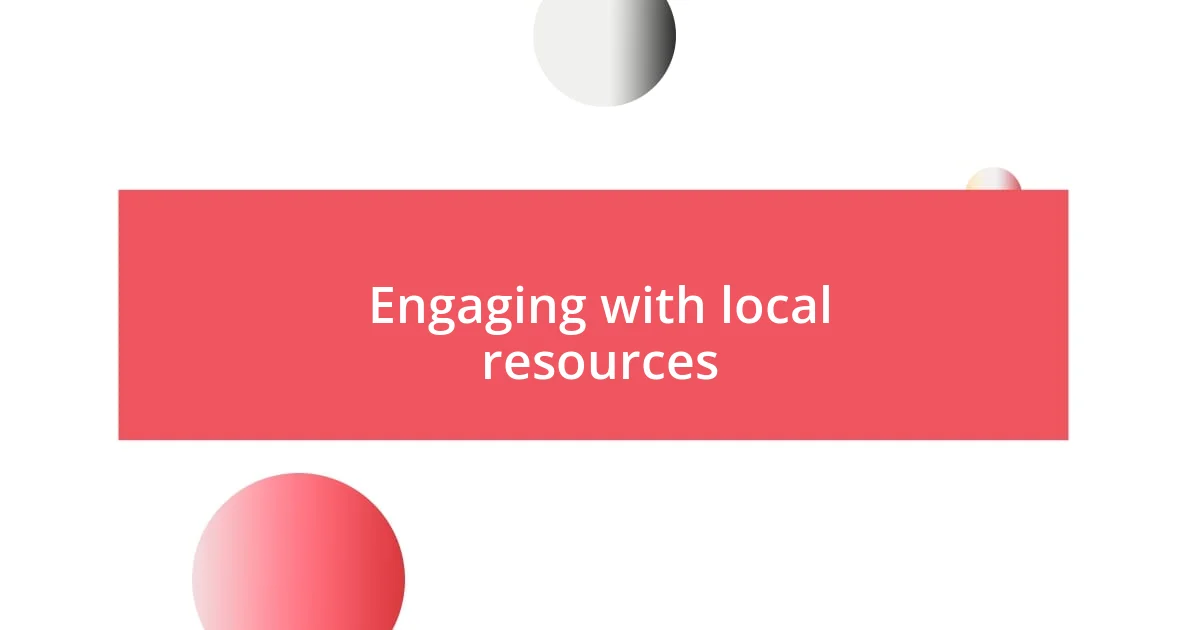
Engaging with local resources
Engaging with local resources has proven to be a game changer in my academic journey. For instance, I remember stumbling upon a local community center that offered free tutoring in math and science. Initially skeptical, I decided to attend a few sessions, and the personalized support I received transformed my understanding of complex topics. Have you ever found support in unexpected places? It’s remarkable how local resources can turn into cornerstones in our learning processes.
I’ve also discovered that local libraries can be treasure troves of knowledge, filled not just with books but also with workshops and seminars. During one of my visits, I joined a language exchange program that not only improved my fluency but also allowed me to connect deeply with my peers. Engaging with local resources has enriched my perspective and helped me build a supportive community around my studies.
Volunteering in the local educational initiatives has been another fulfilling way to interact with community resources. I vividly recall helping out with a local tutoring program and witnessing how the enthusiasm of younger students reignited my passion for learning. It was a reminder that engaging with local resources isn’t just about academic improvement; it’s about building relationships and fostering a sense of belonging. What local resources have you explored that brought unexpected benefits?
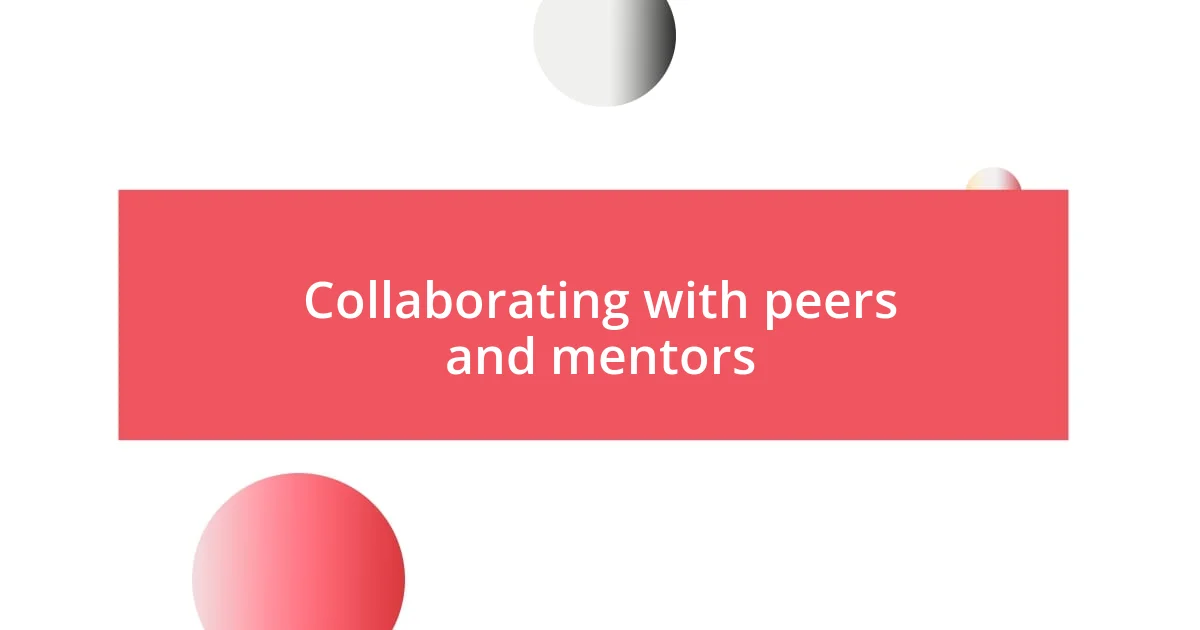
Collaborating with peers and mentors
Collaborating with peers and mentors has been a pivotal aspect of my journey through the intricacies of Asian curricula. I vividly recall a late-night study session where a classmate and I huddled over our textbooks, exchanging perspectives that opened my eyes to concepts I hadn’t grasped before. Have you ever had that moment when a simple discussion transforms your understanding? It’s in these collaborative settings that I’ve found clarity and motivation.
Mentorship also plays a crucial role in cultural navigation. I was fortunate to connect with an experienced professor who not only guided my academic choices but also helped me understand the unspoken rules in the classroom. Their insights on engaging respectfully with authority figures taught me the importance of blending deference with assertiveness. This balance has been critical for my success; without that mentorship, I might still struggle to find my voice.
Moreover, I’ve learned that peer collaborations can be a safe space for vulnerability and growth. In a recent group project, we created a supportive atmosphere, encouraging everyone to share their thoughts. This sense of community not only alleviated my anxiety about speaking up but also reinforced the idea that collective success is more fulfilling than individual achievement. How do your peers lift you up in your academic pursuits?
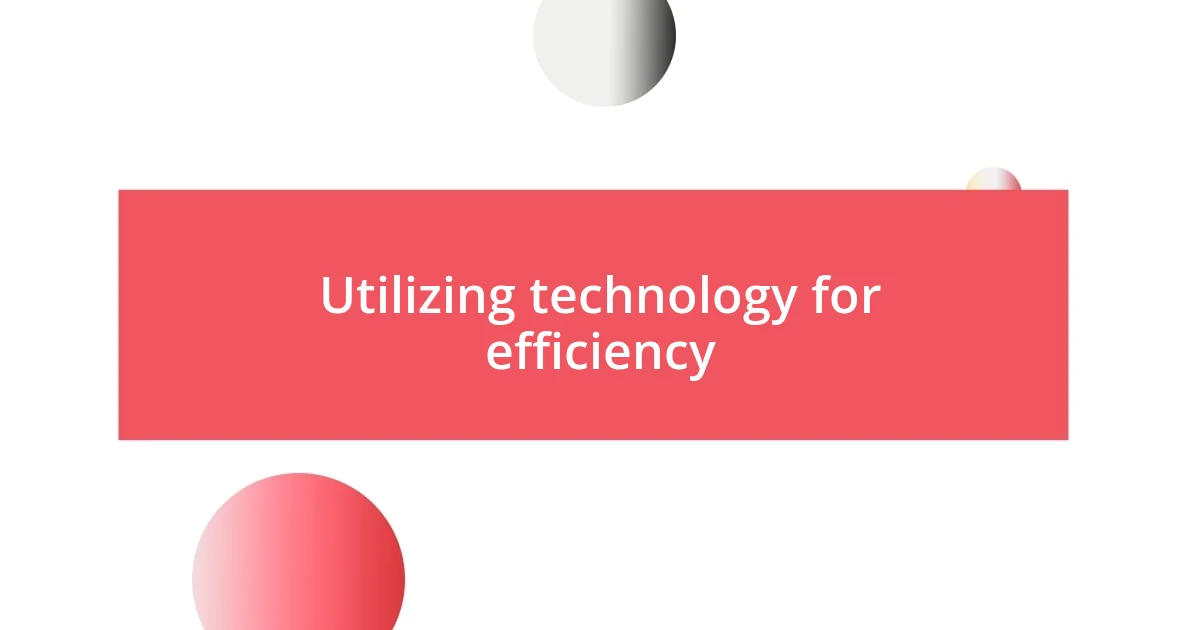
Utilizing technology for efficiency
Utilizing technology has reshaped my approach to studying Asian curricula, enhancing both my efficiency and understanding. I remember downloading an app that allowed me to digitize my notes and categorize them by subject. As simple as it sounds, having everything organized at my fingertips has drastically reduced the time I spent searching for materials, allowing me more time to focus on grasping complex concepts. Have you found that a little tech can streamline your study habits?
I’ve also embraced online collaborative tools, like virtual whiteboards and shared documents, for group projects. One evening, my study group and I utilized these tools to brainstorm ideas for an assignment. The real-time interaction made the process not only more productive but also incredibly engaging. It’s like working together in a classroom without the constraints of time and space. How has technology transformed your collaboration experiences?
Additionally, I often turn to educational platforms and video lectures that provide diverse perspectives on the topics I’m studying. I distinctly recall a series on Asian history that brought the narrative to life through vivid storytelling and relatable examples. Watching these lectures not only supplemented my textbook learning but also reignited my enthusiasm for the subject. Isn’t it fascinating how technology can turn a potentially dry topic into an engaging journey?
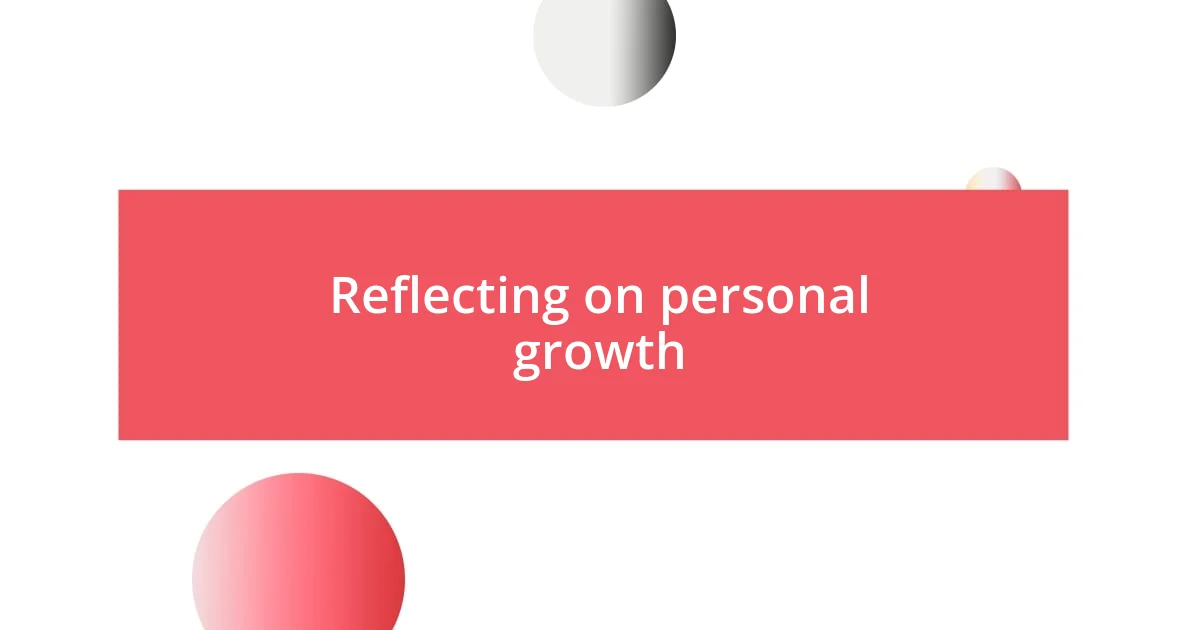
Reflecting on personal growth
Reflecting on my personal growth through Asian curricula has been an enlightening experience. I still remember the first time I stood up to present my research—it was nerve-wracking. But with each presentation, I felt a bit more confident, realizing that my voice deserved to be heard. Can you recall a moment when you surprised yourself with your own progress?
Delving into the variety of perspectives within the curricula has also been transformative. I’ve come to appreciate how history, literature, and philosophy intersect, offering me a richer understanding of the cultures I was studying. For instance, when I analyzed a piece of literature from an Asian author, I felt a deep connection to their experiences, sparking reflections about my own identity. It was a moment where learning transcended mere academic requirements—did you ever find yourself resonating so deeply with a text that it changed your view of the world?
Furthermore, I’ve noticed how embracing challenges has fueled my growth. One semester, I decided to take a class that scared me—it was intensive, and the pace was daunting. Yet, as I pushed through assignments and sought help when needed, I discovered a resilience I didn’t know I had. This realization that discomfort can lead to growth is something I carry with me now. Have you had experiences where stepping out of your comfort zone has led to unexpected benefits?










